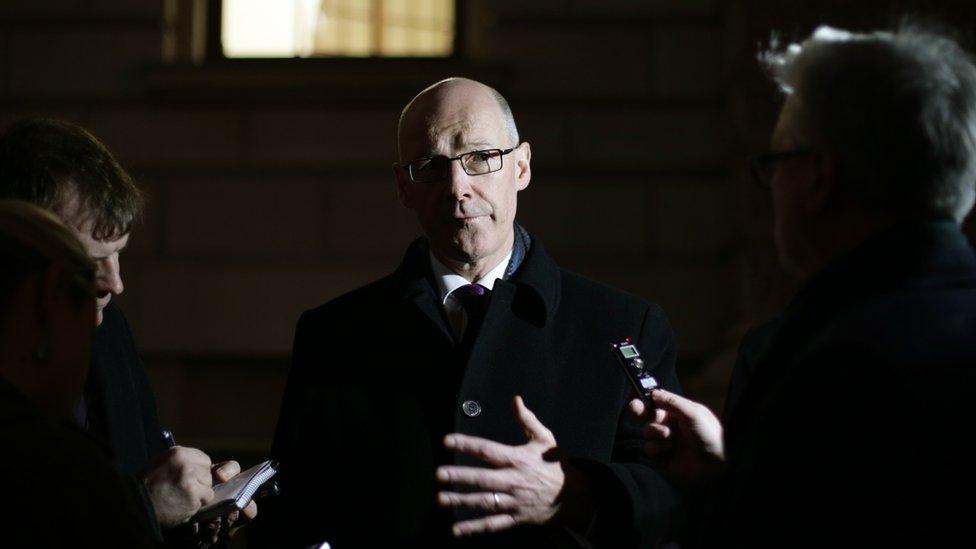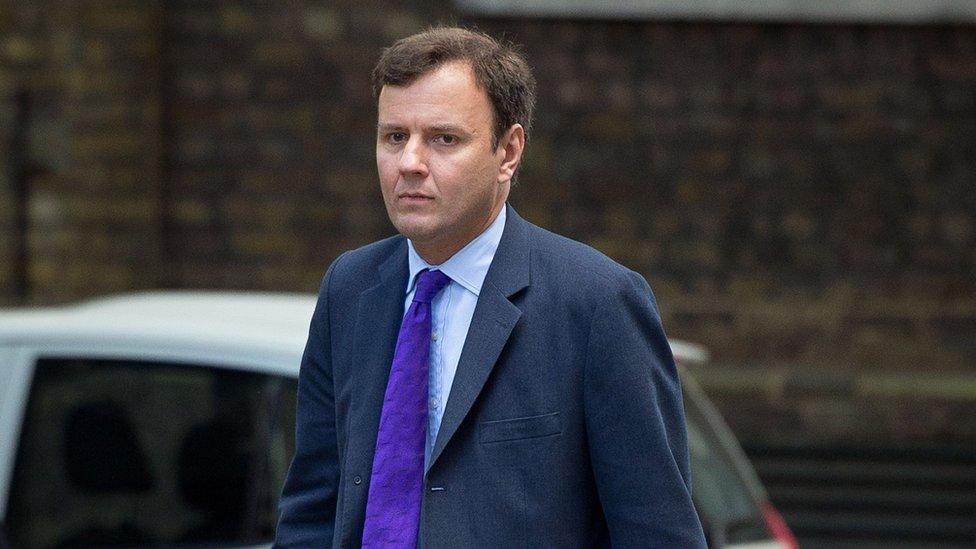Valentines Day deadline for 'fiscal framework' deal
- Published

Valentines Day can stress any relationship. As both parties feel pressurised to celebrate their union according to an artificial and invented date in the calendar.
The delicate relationship between the UK and Scottish governments is no different. By 14 February they are supposed to have agreed the "fiscal framework" that will underpin the transfer of new tax raising powers to the Scottish Parliament.
There is nothing very romantic about these negotiations. They are very detailed discussions of different economic formulae and featuring some rather complex equations. They may be incomprehensible to voters and journalists, but they are very important.
The fiscal framework matters because it will determine how much money Scotland receives from Westminster for decades to come. And it is also very important because if a deal is not agreed soon then the whole package of new powers cannot be devolved before the Scottish elections in May.
A crucial meeting will be held in Edinburgh on Monday between the Scottish Deputy First Minster John Swinney and the Chief Secretary to the Treasury Greg Hands. Publicly both side say they want to do a deal but in private each camp is beginning to sound pessimistic.
Last week the Scottish Secretary David Mundell accused John Swinney of wanting to have his cake, eat it and have a bit of everyone else's cake too. The Scottish government think the Treasury are trying to fob them off with a bran muffin when they believe they are entitled a full Victoria sponge.

Scottish Finance Secretary John Swinney spoke to reporters at the Treasury in London last week
The issue is how to adjust the block grant Scotland receives from Westminster. Once Scotland is given the power to raise its own income taxes the block grant that comes from London will have to be reduced accordingly. The question is how to make that calculation while causing "no detriment" to the taxpayers in Scotland and the rest of the UK.
None of the vocabulary surrounding these discussion is easy to digest. There aren't many kitchen tables around Scotland where people eagerly discuss the merits of "per capita indexation" versus the "levels deduction method". But it is crucially important to the future governance of Scotland and to anyone else who has an interest in whether Scotland remains part of the U.K.
If you want to dig into the detail of some the alternative methods then look here, external.
If you enjoy a bit of algebra, even more complex academic analysis can be found here, external and here, external
Officials from the Treasury and the Scottish government are beavering away on the fine detail. But in the end it will be politicians who will either do a deal or walk away. And politicians are always driven by politics as much as by mathematics.
So what is in it for both sides?

Chief Secretary to the Treasury Greg Hands is involved in the negotiations
The Scottish government are adamant they will not sign up to any deal they think short-changes Scotland. But they equally don't want to be accused of being the party who stood in the way of the Scottish Parliament getting sustainably more powers. If they want more decisions to be taken in Scotland how can they refuse further devolution?
If the UK government don't do a deal they will be accused of reneging on "The Vow" - the promise made, along with Labour and Lib Dems, in the final days of the independence referendum to give substantial new powers to Scotland.
The Scottish Tories want to go into the May elections talking about how they would use the new devolved powers to cut income tax for Scottish voters. And they relish that fight with Labour who have already announced that would use the powers to put up both the basic rate and the top rate of tax. Failure to agree a fiscal framework would rob them of the opportunity to argue over Scottish tax rates.
Both parties can also see an upside to refusing a deal.
The SNP would tell voters they had stood up for Scotland against the perfidious Treasury who were trying to cheat Scotland out of billions of pounds. And then this coming election would be dominated by constitutional issues rather than fiscal ones - a situation that has served the SNP very well in recent years. But the Scottish Tories believe that an election fought on constitutional issues gives them an edge over Labour who they accuse of having gone soft on independence.
The real fight in May's elections is between Labour and the Tories for second place. To see who will become the official opposition to the SNP who seem highly likely to comfortably win in May.

Scottish Secretary David Mundell accused John Swinney of "chancing his arm" last week
There is a level of suspicion and mistrust that underlies these negotiations. The SNP suspect that Treasury ministers care about satisfying English backbenchers who think that Scotland has been getting too generous a deal from London for generations. They might see political gain from being able to say you were the minster who finally ended the "Scottish subsidy".
Tories suspect the SNP of looking forward to the moment when they can walk out these talks furiously insisting they rejected a bad deal for Scotland, a situation that would conveniently mean they wouldn't have to lay out detailed tax plans in their Holyrood manifesto.
But in truth most MSPs really want these new powers. They want the Scottish Parliament to be able to set tax rates and welfare payments. Most of them are hoping that John Swinney and Greg Hands can find a way to kiss and make up by Valentines Day.